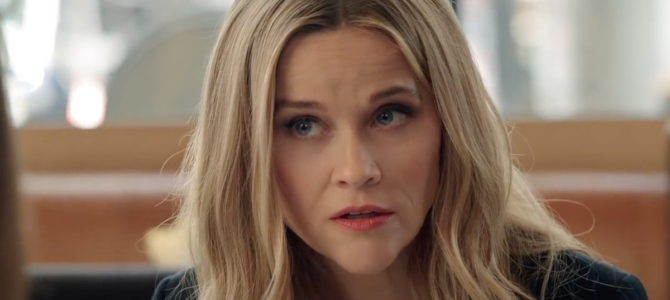Before “Ted Lasso” took off, Apple saw “The Morning Show” as the crown jewel of its pitch to consumers. When Apple TV+ launched last fall, smack in the middle of the streaming wars, “TMS” was its centerpiece. Some critics felt that focus was misplaced.
I didn’t get around to watching “The Morning Show” until this year. It seemed exhausting and heavy-handed, throwing mega celebrities at a corporate-approved Me Too storyline.
What’s the point? Reliving the media’s favorite media story for the sake of watching Jennifer Aniston and Reese Witherspoon on screen together in designer outfits? Actually, that part isn’t so bad. Billy Crudup is shockingly good. Aniston, it should be noted, acts circles around her Oscar-winning co-star.
That’s partially because “The Morning Show” excels at moral ambiguity—and surprisingly so. Like most other characters, Witherspoon’s Bradley Jackson is a terrible protagonist and a complicated antagonist. That makes the actress’s job difficult, but Witherspoon really wants Jackson to be more likable than she is. In season two, the writers add a huge sexual wrinkle to the equation that Jackson handles poorly, but for reasons the script seems convinced should make her more empathetic.
But she’s still deeply selfish and deeply inclined to make bad decisions, no matter how persistent the show wants her moral compass to seem. It’s the cynicism, however, that writers are more willing to assign to Aniston than Witherspoon. Therein lies the problem.
“The Morning Show” grapples with the ladder-climbing, corporate dealings, and identity politics that dominate the press. It explores all of those complex subjects with very compelling nuance and very entertaining storylines. But it’s not quite willing to fully grapple with the rotten morality that induced the industry’s sickness.
It deflects excessively to racial and sexual politics, both of which are legitimate areas of inquiry, but consume the show disproportionately in the same way they consume the industry disproportionately. “TMS” is surprisingly brave and surprisingly comfortable with moral gray areas. From race to adultery to COVID to coastal insularity, the show goes there. The arc of Yanko Flores in season two is very well-executed.
But where Aniston is willing to be irredeemable, even with flashes of decency, Witherspoon is not. That’s an instructive contrast because they’re both complicit in irredeemable moral failings.
In the eyes of “TMS,” Jackson is a small-town girl from a broken family drowning in Manhattan corporatism. That’s a glass-half-full treatment for someone who deserves a glass-half-empty one. There’s little moral ambiguity about her many bad decisions. The same is true of Crudup. Steve Carrell’s take on a Lauer-esque exile is kinder this season than it was the last, although both were surprisingly fair.
“TMS” is a good show, even in spite of Apple’s incessant and conspicuous product placement. It handles difficult subject matter with nuance and confronts the challenges of the times better than almost any other major Hollywood offering. The writing is smart and suspenseful. Think of “TMS” like the Harper’s Letter of television, corporate progressives trying to have their cake and eat it too, questioning their own side’s illiberalism without conceding the cause is rooted in their own ideology—both behind the camera and in front of it.
Essentially “TMS” is exactly what you’d expect from Apple’s foray into television: sleek, elegant, addicting, and smart, but with dubious politics. The futuristic aesthetic feels like progress, an intoxicating distraction from the regressions of secular progressivism.









